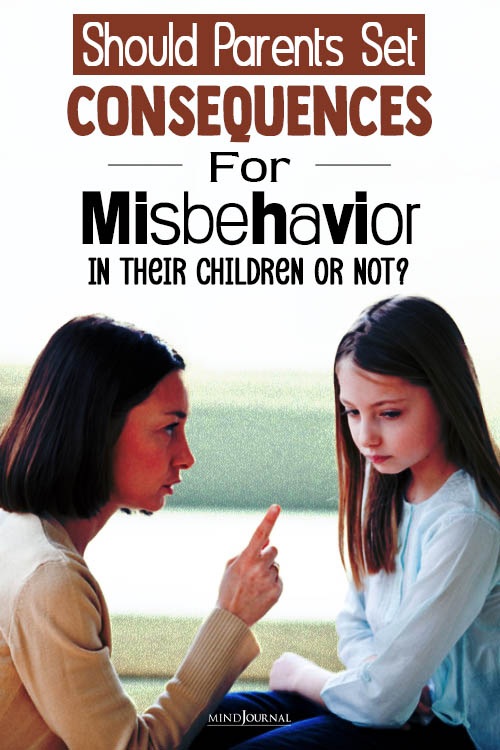You want your child to grow up responsible and disciplined, but should you set consequences for misbehavior? Let’s learn the right balance between discipline and understanding.
Should we set consequences for our children when they don’t do what we want?
Key points
- Research shows that physical punishment predicts negative outcomes in children.
- Authoritative parenting has been found to be the most effective style that yields the happiest children.
- Parents need to be able to tolerate their children being upset, disappointed, sad, or even angry with them.

Should children suffer consequences when they don’t do what we tell them to do?
This question has come up a great deal recently in light of the advent of gentle parenting.
Gentle parenting emphasizes understanding and acknowledging children’s feelings and motivations, setting firm boundaries, giving choices, and avoiding punishments.4
And, yet, this often doesn’t result in the desired outcome. We want our children to do the things we want them to do—like getting dressed, coming to meals promptly, sitting at the table, doing their homework, not fighting with their siblings, etc.—and we struggle with how to accomplish this.
And we don’t just want them to do these things when we tell them; we also want them to learn to do these things without having to be told.
But there’s more. We want our children to internalize good values. We want them to develop their own moral compass. By the time they are 9 or 10, we want them to understand the importance of listening to others, following rules, treating others with consideration, and being honest, among other things.
And often we don’t know how to reach this goal.
Read More Here: Let Kids Be Kids? 6 Identifying Signs of Hurried Child Syndrome
How To Set Consequences For Our Children
So what do we do? Talk to our children each time they do something we don’t like or when they fail to do something we want them to do?
Provide consequences when they don’t do what we tell them to do? Or do we actually punish them—whether by a spanking, the removal of a privilege, or by taking away a promised treat?
Physical Punishment
Well, let’s start with physical punishment. That is a no. Because we have long known that physical punishment is not beneficial for children. In a review article on the subject, Anne B.
Smith states that while physical punishment has often been considered an effective, and even necessary means of socializing children, research has revealed it to be a predictor of a wide range of negative developmental outcomes for children.
There is widespread agreement on this throughout all the recent research done in the area. Physical punishment is associated with increased child aggression, antisocial behavior, lower intellectual achievement, poorer quality of parent–child relationships, mental health problems (such as depression), and diminished moral internalization.
In a review of the literature on this subject, one researcher found that there was also widespread agreement among studies that physical punishment tends to lessen the chances that children will internalize parental rules and values.
Talking to Our Children
Now let’s move on to another alternative: talking to our children. This has been found over and over to enhance children’s understanding of parental expectations as well as maintain the affectional bond between parent and child.
But, as we all know, talking is often not enough. While some advocates of gentle parenting may differ, it has been found that what is more effective than talking alone is setting clear expectations, instituting gentle punishments, such as consequences for misbehavior, and being consistent.
This is called authoritative parenting.
Authoritative Parenting
And the research on parenting is clear on this. In many studies of three types of parenting: authoritative, authoritarian, and permissive, authoritative parenting has been found to be the most effective as well as the style that yields the happiest children.
Authoritative parents are responsive to their children’s feelings and needs, and they are more often supportive than harsh with their children.
This style of parenting is associated with talking together with children about their behavior as well as setting up mild punishments or consequences for misbehavior. Studies have shown that this type of parenting results in lower levels of depression and higher levels of school commitment among adolescents.
Authoritarian Parenting
Meanwhile, authoritarian parents are those who are low in responsiveness to their children yet highly demanding of them. The authoritarian parenting style is associated with emphasizing obedience and conformity and expectations that rules be obeyed without explanation.
Authoritarian parents exhibit low levels of trust and engagement toward their children, discourage open communication, and engage in strict control. And it has been found that verbal hostility and psychological control are the most detrimental of the authoritarian parenting behaviors.
Adolescents from authoritarian families have been found to exhibit poor social skills, low levels of self-esteem, and high levels of depression.
Permissive Parenting
Permissive parenting is characterized by high levels of responsiveness to children coupled with low levels of demandingness. Permissive parents affirm their children’s impulses, desires, and actions and consult with their children about decisions.
In results that may surprise you, adolescents from permissive families report a higher frequency of substance use and school misconduct and are less engaged and less positively oriented to school compared to individuals from authoritative or authoritarian families. And permissive parenting is also associated with low self-esteem in children.
So back to the question: What is the best thing for parents to do?
Well, it seems to me that what some people call “gentle parenting” can end up being a lot like the “permissive parenting” I described above.
And, according to the research, authoritative parenting seems to yield happier children and children who eventually internalize the rules.
So this means setting clear rules and limits for your children starting early, talking to them about these, and instituting clear, mild punishments, or what I call consequences, for when children do not do what you have told them to do.
And notice, I use the words, “what you have told them to” instead of what you have “asked.”
It is time to stop saying, “OK?” after each thing we tell our child to do. As the parent, it is time we stop asking our children to do things we actually want them to do. It may be hard to act like an authority with our children, but generational boundaries are important. Our children need to know that, in the end, we, as the parents, are the boss.
As parents, we are often afraid to set limits or to give consequences. We are afraid of making our children unhappy or angry. We are afraid of meltdowns—whether in public (embarrassing) or at home (frustrating).
But we have to understand that we need to be able to tolerate our children being upset, disappointed, sad, or even angry with us if we want them to learn how to do what we want them to do and if we want them, eventually, to internalize the values we hold dear.
So, let’s start to institute consequences, be consistent, and let the consequences fit the misbehaviors. Often called logical consequences, these will make sense to you and your child. For example, if your child does not put on her pajamas in time for her to have books read to her on a certain night, then story time will have to wait until tomorrow.
Read More Here: How To Deal With A Disrespectful Grown Child: 10 Parenting Moves That Work
References
1. A. Mageau, Joannie Lessard, Joëlle Carpentier, JeanMichel Robichaud, Mireille Joussemet, Richard Koestner (2018). Effectiveness and acceptability beliefs regarding logical consequences and mild punishments. Journal of Applied Developmental Psychology, Vol 54, Jan-Feb, 2018.
2. Smith, Anne B. (2006) The state of research on the effects of physical punishment, Ministry of Social Development, New Zealand.
3. Hoskins, Donna. (2014). Consequences of Parenting on Adolescent Outcomes.Societies,
4(3), 506–531; https://doi.org/10.3390/soc40305064. Winter, Jessica. 2022. The harsh realm of gentle parenting. March 23, 2022, The New Yorker.
Share your thoughts about this in the comments below!
Written by: Corinne Masur, Psy.D
Originally appeared on Psychology Today










Leave a Reply